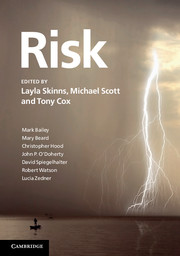Book contents
- Frontmatter
- Contents
- Figures
- Tables
- Acknowledgements
- 1 Introduction
- 2 Quantifying uncertainty
- 3 Decisions, risk and the brain
- 4 Risk and government
- 5 Risk and the humanities
- 6 Terrorism and counterterrorism
- 7 Risk and natural catastrophes
- 8 Risk in the context of (human-induced) climate change
- Notes on the contributors
- Index
7 - Risk and natural catastrophes
The long view
Published online by Cambridge University Press: 05 June 2012
- Frontmatter
- Contents
- Figures
- Tables
- Acknowledgements
- 1 Introduction
- 2 Quantifying uncertainty
- 3 Decisions, risk and the brain
- 4 Risk and government
- 5 Risk and the humanities
- 6 Terrorism and counterterrorism
- 7 Risk and natural catastrophes
- 8 Risk in the context of (human-induced) climate change
- Notes on the contributors
- Index
Summary
Summary
Natural catastrophes – rare, high-consequence events – present us with a unique conjunction of problems so far as risk is concerned. Firstly, they can have an extremely long recurrence interval – so long that the greatest may not have occurred within human memory. Secondly, the effects of events with which we are all too familiar, for example earthquakes, floods, volcanoes and storms, are easily trumped by the impacts of objects – comets and asteroids – that reach Earth from outer space; and thirdly, the largest of these events have a global reach, in principle threatening not just our way of life but perhaps life on Earth itself. However, recognising that such events occur very rarely, should we ‘make hay while the sun shines’ and ignore, ostrich-like, the significant actuarial risk; or should we seek to understand the underlying phenomena and develop strategies to mitigate the threat, and perhaps technologies to avert it? Our individual response often depends less on a purely rational assessment than on personal circumstances and how we have been brought up. In any case the nature of the risks, which are poorly understood, means that we must be prepared to handle the law of unintended consequences (that is, could our actions make things worse?). We must also be prepared to explore what happens if, perhaps inevitably, our current scientific understanding turns out to be less certain than many experts believe.
Introduction
Rare, high-consequence events present society with exceptional difficulties so far as risk assessment is concerned. The infrequency of the most extreme events means that their causes are often among the most poorly understood among environmental issues and their impacts are – fortunately – poorly known from direct experience. In addition, natural catastrophes may have an origin either entirely within the Earth-system or from outside: from the Sun, solar system or wider Universe of which the Earth is a part. It is widely accepted that the potentially devastating effects of cosmic phenomena are likely, in the long term, to far outweigh any purely Earth-based cataclysm.
- Type
- Chapter
- Information
- Risk , pp. 131 - 158Publisher: Cambridge University PressPrint publication year: 2011
- 2
- Cited by

